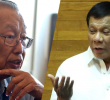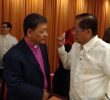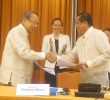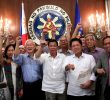
(From L-R) National Democratic Front of the Philippines peace panel chairperson Fidel Agcaoili, Norwegian Special Envoy Elisabeth Slattum, Philippine government peace panel member Hernani Braganza and peace panel chair Silvestre Bello III during the third round of talks in January 2017 at the Holiday Inn in Rome, Italy. (davaotoday.com file photo)
DAVAO CITY, Philippines — The Royal Norwegian Embassy announced Tuesday the resumption of the new round of talks between the Philippine government and the National Democratic Front of the Philippines.
Representatives of the government and the NDFP will meet for the fourth round of talks in Noordwijk in the Netherlands on April 2 to 6.
Norwegian Ambassador to the Philippines Erik Førner said they are pleased that both Parties will continue talks and pledged that Norway will continue to assist them in the peace process. Norway has been a facilitator of the peace process since 2001.
“I am pleased that representatives of the Philippine Government and the NDFP will meet for a new round of talks. Despite challenges along the way, the parties continue to show their commitment to peace. Norway will continue to assist the parties as the third party facilitator of the peace process”, said Førner.
Among the issues to be discussed in this round is the social and economic reforms and a bilateral ceasefire agreement.
On March 10 to 11, both Parties engaged in a backchannel talks in Utrecht, The Netherlands in a bid to revive the talks.
The informal talks concluded successfully and both Parties agreed to resume the formal talks as scheduled during the last round of talks in Rome, Italy.
The Parties also agreed to forge an interim bilateral ceasefire “which will take effect after the terms of reference and the other considerations shall have been settled.”
Terminated
After three rounds of talks, President Rodrigo Duterte terminated it on February 4 following the announcement of the Communist Party of the Philippines and the New People’s Army, the armed-wing of the CPP that they are lifting the unilateral ceasefire.
Duterte lamented the killing of government troops in Bukidnon province on February 2, a day after NPA National Operations Command spokesman Ka Oris announced that they are lifting the unilateral ceasefire which will take effect later on Feb. 10.
Duterte said he will only revive the talks if there is a “compelling reason” for it to continue.
Ka Oris said they have decided to terminate the ceasefire for two reasons: the non-compliance of the GRP with its obligation to amnesty and release of all political prisoners under the Comprehensive Agreement on Respect for Human Rights and International Humanitarian Law and the Joint Agreement on Safety and Immunity Guarantees, and the encroachment of the government troops on their territories using the unilateral interim ceasefire as “license”.
“Across 164 municipalities and 43 provinces, the GRP’s armed forces have occupied at least 500 barrios which are within the authority of the revolutionary government,” he said.
While the third round of talks is on going in Rome, Italy, an NPA fighter and eight soldiers were killed after a military offensive in Makilala town, North Cotabato on January 21.
Conditions
In his speech before the Filipino community in Myanmar on Sunday, March 19 Duterte the Communists should agree to a ceasefire in writing “so that we can estabilish the parameters.”
He also said he will not withdraw government troops in the Communists’ territories.
“Ako ang may-ari ng buong Pilipinas, representing the Republic of the Philippines. Hindi ako papayag na may teritoryo na hindi amin. Akin lahat yan…It’s not for you to claim,” Duterte said.
He also said the NPA should release all its prisoners and stop the collection of revolutionary tax.
“Otherwise, giyera tayo. We have been at it for 50 years. Do you want another 50 years? Are you good for another 15 years?” he said.
Stick to the agenda
Independent cooperator for the NDFP, Satur Ocampo said both Parties should stick to the substantige agenda of the peace talks which is: social and economic reforms, political and constitutional reforms and end of hostilities and disposition of forces.
Ocampo, in an interview with Davao Today said, ceasefire is a “secondary aspect of the peace negotiations.”
“Ang important ay yung sticking to the agenda of the peace talks. Calling for mutual or bilateral ceasefire is only to improve the atmosphere of the negotiations and to lessen the violence,” he said.
Norwegian Special Envoy to the peace process, Elisabeth Slåttum will chair the talks this April. (davaotoday.com)









